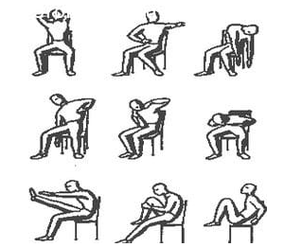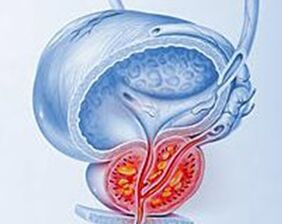In men, prostatitis is the most common urological disease among men. According to statistics, the number of men with this diagnosis is up to 8% of the male population worldwide, 1/3 of whom have a chronic form of the disease. In 40% of cases, chronic prostatitis is detected in men before the age of 40.
A distinctive feature of prostatitis is the almost complete absence of its acute form. As soon as it appears, it passes into a chronic form.
The incidence of complete recovery after the initial acute phase (spontaneous or as a result of treatment) is small. The course of the disease is very slow, and the symptoms of prostatitis often smooth out. Prostatitis manifests itself in three main syndromes: painful, sexual and dysuric.
Causes of prostatitis in men
The causes of prostatitis are infections, stagnation in the prostate gland and a combination of these two factors. One of the factors contributing to the development of chronic prostatitis is the presence of benign hyperplasia in the patient.
The infection can enter the prostate gland as follows:

- from the urethra through sexual intercourse as a complication after infectious urethritis;
- blood from existing infections of the body (toothache, sinusitis, pneumonia, etc. );
- from the internal inflammatory organs through the lymph (intestinal dysbiosis, hemorrhoids, inflammation of the rectum).
In men, prostatitis is often non-infectious (abacterial prostatitis). The main reason for this is the disruption of blood circulation in the prostate and surrounding organs as a result of stagnation of secretions inside.
Stagnation of secretion in the prostate gland can occur due to the following factors:
- long-term sexual abstinence;
- unprotected sex after sexual arousal;
- disconnected connection;
- defective discharge.
Factors predisposing to the development of prostatitis:
- irregular sex life;
- hypothermia;
- hypodynamics;
- chronic stress;
- chronic alcoholism, etc.
Symptoms of prostatitis in men
- pain in the genitals;
- pain in the groin, perineum, suprapubic region;
- desire to urinate frequently;
- painful sensations when urinating;
- pain with discharge;
- defective erection or deficiency.
Chronic prostatitis is often associated with neurasthenia caused by the above disorders.
In prostatitis, the pain is usually radiant, ie it spreads to the sacrum, perineum or scrotum. All organs of the pelvis, smaller than the prostate, have nerve endings, so the pain is often transmitted to the lower back. Their intensity varies - from subtle to sudden pronunciation, and even disrupts sleep. The pain may be exacerbated, weakened by sexual abstinence, or, conversely, may be caused by excessive sexual activity or ejaculation. Remember that pain in the sacrum does not always indicate prostatitis - it can also indicate osteochondrosis.
How prostatitis manifests itself in men with a chronic form, the situation is completely different here. His walk is like a wave; Periodic exacerbations are replaced by more or less prolonged remissions in which the disease does not manifest itself in any way. In this situation, men rarely go to the doctor, preferring to stay at home. However, this is not the way out, because in men, prostatitis, the exacerbation of which will progress over time. And it will spread through the genitourinary system and cause cystitis and pyelonephritis.
Prostatitis in men: consequences

As a rule, patients with acute prostatitis consult a doctor in a timely manner. But if you do not consult a urologist in time, then there is a high probability of focal purulent inflammation - an abscess of the prostate gland. In this case, the body temperature can rise to 39-40 ° C, become tense (drop in body temperature is more than 1 ° C), and intense fever is periodically replaced by chills. Pain in the perineum is so pronounced that urination and defecation are extremely impossible. Gradually, the prostate gland swells, resulting in urinary retention. Fortunately, men rarely find themselves in such a situation.
Vesiculitis is one of the most common complications of prostatitis, in which the seminal vesicles become inflamed. Also epididymo-orchitis, characterized by inflammation of the testicles and their appendages. Treatment of chronic prostatitis in men caused by these diseases will be extremely difficult and time consuming.
Both diseases can cause infertility. Everything described is related to chronic prostatitis, which has a more specific etiology and develops as a result of sexually transmitted diseases. Treatment of prostatitis in men and any form of drug treatment is prescribed by a urologist.
Treatment of prostatitis in men
How to treat prostatitis in men depends on the form and appearance of the disease. In the treatment of acute prostatitis, antibiotics are used that penetrate well into the tissue of the prostate gland. The prescription specialist must take into account all the individual characteristics of the disease, the state of the body's immune system and the presence of infectious agents. If the course of the disease is not complicated in any way, patients with acute prostatitis are treated only on an outpatient basis. Only patients with severe and severe intoxication symptoms are hospitalized. Such physiotherapeutic methods are widely used: magnetic-laser-inductotherapy, reflexology, ultrasound, leprosy treatment of prostatitis. A good effect can be achieved by using herbal medicines (herbal medicines), enzymes, cytomediators, immunomodulators. Prostatitis surgery is indicated in the following cases:
- prostate abscess (trans-urethral or transrectal drainage of the abscess);
- acute urinary retention (puncture episistostomy).
Treatment of chronic prostatitis in men is carried out in an outpatient setting, but for a longer period of time. In addition to the use of antibiotics, suppositories and thermal therapy, prostate massage and reflexology are also performed. In addition, patients with prostatitis are advised to lead an active lifestyle and avoid alcohol and spicy foods.
Prevention of prostatitis in men
Timely treatment and prevention of prostatitis in men helps to improve rapidly. As a preventive measure to prevent the development of chronic prostatitis is recommended:
- regular sex life;
- properly selected diet (various and nutritious foods, except spicy and irritating foods);
- alcohol abuse;
- moderate physical activity aimed at improving blood circulation and strengthening muscles in the genitourinary system, Kegel exercises (tension of the perineum muscles with retraction of the anus);
- adequate and timely treatment of infectious diseases of other organs;
- prevention of small pelvic congestion using physiotherapy methods.
To exclude recurrence of the disease - secondary prevention of prostatitis, primary prophylaxis and include:
- regular preventive examinations with a urologist;
- to undergo strengthening courses, prophylactic treatment with multivitamins;
- physiotherapy methods (especially in spring and autumn).






























